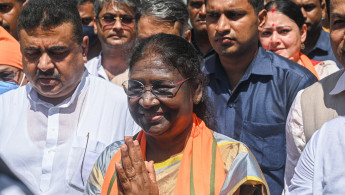India elects first President from tribal community
Lawmakers chose India's first president from the country's tribal communities on Thursday, which could boost the appeal of Prime Minister Narendra Modi's Hindu-nationalist Bharatiya Janata Party (BJP) among marginalised groups ahead of the 2024 general election.
Droupadi Murmu, a 64-year-old teacher turned politician, will be the second woman to hold the largely ceremonial role as head of the republic when she takes office on July 25 at the start of a five-year term.
Elated by all of the support from my all political colleagues Ministers, MP's and MLA's from all -around India for choosing me to serve as the 15th President in the world's largest democratic country Mother India. (1/3)
— Draupadi Murmu • ଦ୍ରୌପଦୀ ମୁର୍ମୁ (@draupadimurmupr) July 21, 2022
More than 4,500 state and federal lawmakers voted in the presidential election on Monday and ballots were counted on Thursday. Murmu's victory was assured as she was backed by Modi's Bharatiya Janata Party (BJP), which dominates federal and state politics.
"A daughter of India hailing from a tribal community born in a remote part of eastern India has been elected our President!" Modi said on Twitter.
Born into a family of the Santhal tribe from the state of Odisha, Murmu started her career as a school teacher and actively participated in community issues.
She later joined mainstream politics and served as a BJP state lawmaker in Odisha before becoming governor of the eastern state of Jharkhand.
Congratulations to #DraupadiMurmu the first woman from a tribal background to become the President, 72years after India got the status of the Republic. The Tribal population of the country expects u to protect their rights & dignity from the anti-tribal policies of the Modi Govt. pic.twitter.com/8ug6T3nQhx
— Hansraj Meena (@HansrajMeena) July 21, 2022
Her election is seen as the BJP's outreach to India's tribal communities, which comprise more than 8% of its 1.4 billion people.
"The BJP will want to offset any anti-incumbency of the last 10 years in 2024, and one of the ways to do that is to go for a new vote-base," political columnist Neerja Choudhary told Reuters.
Murmu beat the opposition candidate Yashwant Sinha, a former BJP finance minister and now a fierce critic of Modi, winning nearly twice as many votes.
The Indian president acts as the Supreme Commander of the Armed Forces but the prime minister holds executive powers. Murmu will take over from Ram Nath Kovind.
The president, nevertheless, has a key role during political crises, such as when a general election is inconclusive, by deciding which party is in the best position to form a government.





 Follow the Middle East's top stories in English at The New Arab on Google News
Follow the Middle East's top stories in English at The New Arab on Google News


